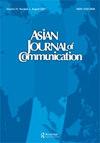Reflexive racialization and discursive affect with the #VeryAsian Hashtag
IF 1.5
2区 文学
Q2 COMMUNICATION
引用次数: 1
Abstract
ABSTRACT On 2 January 2022, Michelle Li, a local anchor in St. Louis, played a video on Twitter of herself listening stoically to an irritated caller, who complained that Li was being ‘very Asian’ for mentioning that her family ate ‘dumpling soup’ on New Year’s Day. She claimed that a White person talking about White foods would be fired. The call and Li’s response resonated among Asian Americans and prompted a viral hashtag, #VeryAsian. The essay argues that users engaged in earnest accounts of their pride and lack of shame in pan-ethnic racial belonging as well as their ethnic heritage cultures. Notably, this meant eschewing memes, a common feature of Twitter discourse, and the racial humor of signifyin’, a feature of Black Twitter. As a networked counter-public, the posts were affirmative articulations of pride rather than explicit anti-racist critique. Even when anger was mobilized and anti-Asian hate was named, the systems or people that produce it were abstracted, demonstrating the liminality of Asian American experience and the context collapse of Twitter.反身性种族化与#VeryAsian标签的话语影响
摘要:2022年1月2日,圣路易斯当地的主播Michelle Li在Twitter上播放了一段视频,视频中她坚忍地听着一位愤怒的来电者的声音,这位来电者抱怨她提到她的家人在元旦吃了“饺子汤”,这是“非常亚洲化”的表现。她声称白人谈论白人食物会被解雇。这一呼吁和李的回应在亚裔美国人中引起了共鸣,并引发了一个病毒式的标签,#VeryAsian。这篇文章认为,用户认真地描述了他们对泛民族种族归属和民族遗产文化的自豪感和羞耻感。值得注意的是,这意味着要避开表情包,这是推特话语的一个共同特征,以及象征的种族幽默,这是黑人推特的一个特征。作为一个网络化的反公众,这些帖子是对骄傲的肯定表达,而不是明确的反种族主义批评。即使愤怒被动员起来,反亚裔仇恨被点名,产生这种仇恨的系统或人也是抽象的,这表明亚裔美国人的经验是有限的,以及Twitter的语境崩溃。
本文章由计算机程序翻译,如有差异,请以英文原文为准。
求助全文
约1分钟内获得全文
求助全文
来源期刊

Asian Journal of Communication
COMMUNICATION-
CiteScore
3.70
自引率
0.00%
发文量
38
期刊介绍:
Launched in 1990, Asian Journal of Communication (AJC) is a refereed international publication that provides a venue for high-quality communication scholarship with an Asian focus and perspectives from the region. We aim to highlight research on the systems and processes of communication in the Asia-Pacific region and among Asian communities around the world to a wide international audience. It publishes articles that report empirical studies, develop communication theory, and enhance research methodology. AJC is accepted by and listed in the Social Science Citation Index (SSCI) published by Clarivate Analytics. The journal is housed editorially at the Wee Kim Wee School of Communication and Information at Nanyang Technological University in Singapore, jointly with the Asian Media Information and Communication Centre (AMIC).
 求助内容:
求助内容: 应助结果提醒方式:
应助结果提醒方式:


